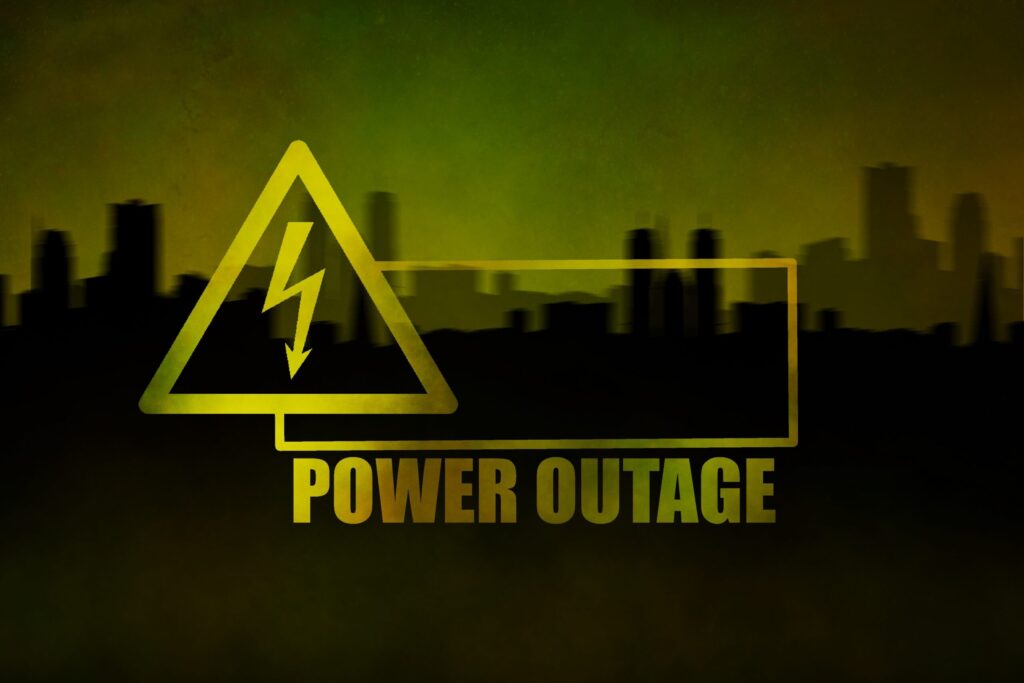
Power Outages
The community as a whole and the economy may be impacted by prolonged power outages. When the electricity suddenly goes off, there is a power outage.
During a power outage,
- Disrupt communications, water and transportation.
- Close retail businesses, grocery stores, gas stations, ATMs, banks and other services.
- Cause food spoilage and water contamination.
- Prevent use of medical devices.
Power Outage Tips
- Keep freezers and refrigerators closed.
- Use a generator, but ONLY outdoors and away from windows.
- Do not use a gas stove or oven to heat your home.
- Disconnect appliances and electronics to avoid damage from electrical surges.
- Have alternate plans for refrigerating medicines or using power-dependent medical devices.
- Check with local officials about heating and cooling locations open near you.
How to Protect Yourself During A Power Outage
If the weather is extremely hot or cold, go to a public place with electricity.
Preparing for a Power Outage
Make a list of the things you require that require electricity. When the power goes out, prepare with batteries and other backup power sources like a power bank or portable charger to suit your demands. Ensure that each household member has a flashlight. Ascertain the battery life of your house phone and whether it will function if there is a power outage.
Know Your Medical Needs
If you use electrically powered medical equipment or refrigerated medications, discuss a power outage plan with your healthcare professional. Learn how long medication can be kept at higher temperatures and get particular advice for any life-saving medications.
Using Appliances During Power Outages
Install battery-operated carbon monoxide detectors in strategic spots throughout your home’s several levels. Avoid breathing in carbon monoxide. Always use generators, camp stoves, or charcoal grills outside, at least 20 feet away from windows. Never heat your house using a gas stovetop or oven. Disconnect or turn off any appliances, machinery, or electronics. Power may come back on with brief spikes or surges that could be harmful.
Food Storage
water and non-perishable food in ample supply. Keep refrigerators and freezers closed. Food will stay cold in the refrigerator for around four hours. For roughly 48 hours, a full freezer will maintain the temperature. If required, use ice-filled coolers. Use a thermometer to check the temperature. If the temperature is 40 degrees or greater, throw the food away.
Generator Safety
The use of generators is advantageous when the electricity goes out. In order to avoid risks like carbon monoxide (CO) poisoning, it’s critical to know how to utilize them safely.
- Generators and fuel should always be used outdoors and at least 20 feet away from windows, doors and attached garages.
- Install working carbon monoxide detectors on every level of your home. Carbon monoxide is a colorless, odorless gas that can kill you, your family and pets.
- Keep the generator dry and protected from rain or flooding. Touching a wet generator or devices connected to one can cause electrical shock.
- Always connect the generator to appliances with heavy-duty extension cords.
- Let the generator cool before refueling. Fuel spilled on hot engine parts can ignite.
- Follow manufacturer’s instructions carefully.
Returning After A Power Outage
- When in doubt, throw it out! Throw away any food that has been exposed to temperatures 40 degrees or higher for two hours or more, or that has an unusual odor, color or texture.
- If the power is out for more than a day, discard any medication that should be refrigerated, unless the drug’s label says otherwise. Consult your doctor or pharmacist immediately for a new supply.